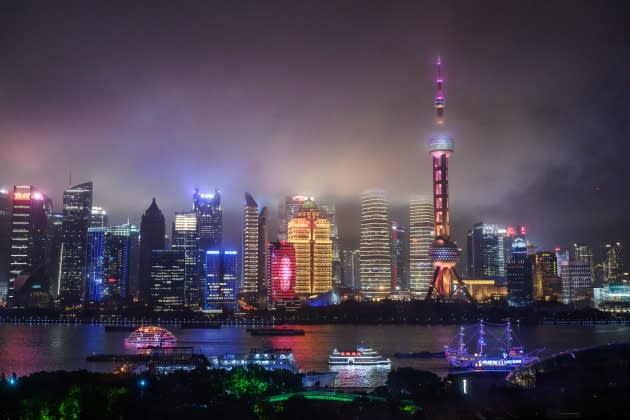Shunned in the West, Russia’s Movie Industry Is Embraced at China’s Shanghai Film Festival (Exclusive)

Members of the Russian movie industry may be personae non gratae at the great festivals of the West, but at the Shanghai International Film Festival, China’s most prestigious cinema event, they will be welcomed with open arms.
In the wake of Russia’s full-scale invasion of Ukraine in Feburary 2022, the Cannes, Venice, Berlin and Toronto international film festivals and markets all imposed blanket bans on Russian delegations and film companies connected to the Putin government. The events only made an exception for individual Russian artists and filmmakers, who continue to be welcomed, provided they don’t have state affiliation.
More from The Hollywood Reporter
The Shanghai film festival has taken a much different approach to wartime Russia’s movie sector — one in keeping with China’s so-called “no limits” geopolitical partnership with the Kremlin.
At the 2023 SIFF Market, a tradeshow-like event that runs in tandem with the festival, and where new international movies are bought and sold, Roskino, Russia’s state-backed film promotion body, will organize a booth titled “Russian Content Worldwide,” where 18 companies will present some 75 new Russian films. It will be Russia’s largest presence at the Shanghai movie market to date.
“Our first, and such large-scale, offline presence at the SIFF Market will significantly strengthen relations between Russian film and animation companies and Chinese and other Asian market participants,” said Ekaterina Naumova, CEO of Roskino, in an official promotional release seen by The Hollywood Reporter ahead of the event. “We are building our work with China, interacting both with the professional industrial community and with wider audiences.”
In recent years, Russian films have not had much presence at China’s commercial box office. One exception is Russia’s internationally popular animated Snow Queen franchise, produced by Voronezh Animation Studio. The Snow Queen 3: Fire and Ice earned $11.5 million in China in 2018, and The Snow Queen 4: Mirrorlands took in $3.3 million in 2019. The fifth film in the franchise, The Snow Queen & The Princess, which released in Russia in February, will be one of the new titles on offer at the Russian booth in Shanghai. Other titles shopped in China will include the fishing-ship disaster film Three Minutes of Silence, the period detective movie In the Moscow Slums, and the action-comedy The Silver Spoon Goes South, among many others. The SIFF Market runs June 10-12 at the Longemont Shanghai Hotel.
As Russia’s most important geopolitical partner by far, China’s support of the Russian culture sector comes as little surprise. But other non-aligned nations have also hosted Russian film activities in recent months. In November, India hosted a Russian film festival in Mumbai backed by Roskino. The Russian state film body also arranged for 18 Russian movie companies to participate in Telefim Vietnam, a film and TV market in Ho Chi Minh City that kicked off on Thursday.
Some have begun to question how effective the major Western film festival markets’ boycott of Russia has been — beyond signaling solidarity with Ukraine. The major Hollywood movie studios have maintained similar boycotts on distributing their blockbusters to Russia, a move that has unquestionably deprived Russian cinemas of millions in potential ticket sales. But U.S. and European indie studios — the types of companies that typically do business at film festival markets — never stopped selling movies into the lucrative Russian market.
As THR recently reported during Cannes, the indies have only become quieter and more covert about their Russia dealings. The list of recent indie flicks that have secured a Russian release includes STX’s Guy Ritchie war movie The Covenant, XYZ Films’ Berlin Film Festival favorite BlackBerry, Goodfellas’ Iranian thriller Holy Spider, and the surprise exploitation hit Winnie The Pooh: Blood and Honey from Premiere Entertainment.
Russian studios have had far less luck, however, doing business in the opposite direction — selling their domestic titles to the outer world — as of late. That’s a pattern they’ll hope to begin reversing during the upcoming film market in Shanghai.
Best of The Hollywood Reporter
Natalie Portman at Cannes: "I Need to Leave the Drama for the Screen"
Ailing ‘Superman’ Star Valerie Perrine Finally Finds Her Hero: "The Guy Should Be Sainted"

